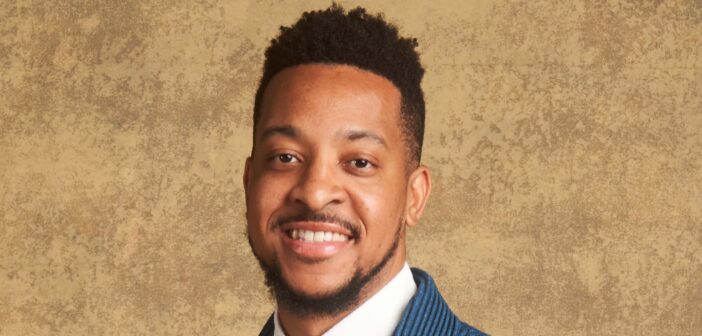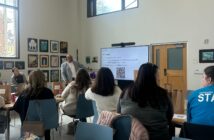CJ McCollum, ‘13, point guard for the New Orleans Pelicans, will deliver the 2023 commencement address at Lehigh’s 155th Undergraduate Commencement Ceremony on May 21.
McCollum majored in journalism with minors in mass communication and sociology. He covered sports content as an editor for The Brown and White and interned with Lehigh Athletics, which he said gave him a deeper appreciation for all athletes on campus.
Sporting the number 3 — which is now retired at Lehigh — McCollum played for the men’s basketball team as a guard. He racked up accolades as a Mountain Hawk including being named Patriot League Player of the Year in 2010 and 2012. As a junior, he helped Lehigh beat Duke 75-70 in the 2012 NCAA Tournament, recording a game-high 30 points.
McCollum was picked 10th overall in the NBA draft by the Portland Trail Blazers in 2013, becoming the first-ever player to enter the NBA from Lehigh. In his third season with the team, he was named the 2015-2016 Most Improved Player. In 2022, he was traded to the New Orleans Pelicans.
He serves as the president of the National Basketball Players Association, a union for current NBA players, and the NBPA Foundation. He created the CJ McCollum Dream Centers, which works to provide necessary resources to students from underserved communities, and CJ’s Press Pass Program, a journalism-based mentorship program for high school students.
McCollum is an NBA analyst for ESPN and hosts “The CJ McCollum Show” podcast.
McCollum spoke with The Brown and White to reflect on his time at Lehigh, speak on his career endeavors and successes and offer advice to Lehigh graduates.
Q: What was your reaction to being asked to speak at commencement?
CJ McCollum: I was very surprised. I was thankful, I felt honored. Understanding the severity and the magnitude of this, to be able to address graduating seniors at my alma mater 10 years after I graduated is something I don’t take for granted. I’m thankful and appreciative of the honor and really look forward to getting back on campus and hopefully delivering a speech that this class will remember forever.
Q: Why did you choose to study journalism, mass communications and sociology?
CM: I chose mass communication because I felt – based on this trajectory of what I wanted to accomplish post-basketball – it will be important for me to be able to speak a certain type of way (and) really focus on storytelling to be able to tell my story. I thought it would also be very beneficial for my playing career to better understand the media, how to speak to them and how to allow people to get to know me in a different manner.
For sociology, I’ve always been fascinated with people and wanting to learn more about people in terms of where we come from, what we come from, and being able to meet them where they are and just being comfortable in many different rooms. As you get older and become an adult and travel, (with) the sport I play, you’re meeting people from many different walks of life, and sociology has helped shift my perspective on people in general.
Q: Can you reflect on your experience playing for the Mountain Hawks?
CM: My basketball experience was amazing in terms of my growth, the friendships that I made, the friendships that I still have to this day, and the importance of working with other people and working in groups, being able to sacrifice, being selfless, understanding that you have to be willing to sacrifice to be successful.
I think our team grew together collectively, and, obviously, my junior season we ended up upsetting Duke, which is my claim to fame, if you will, in terms of my college career that kind of propelled me into the eyes of the national media and National Basketball Association.
I’m forever grateful for Lehigh and also my basketball games because it made me a better person. It made me more well-rounded and allowed me to accomplish my dream of playing Division I basketball and eventually make it to the NBA.
Q: You were projected to be the top NBA draft pick by your junior year but you decided to finish your final year of college. Why did you choose to do that?
CM: For a combination of reasons. I promised my mother I would finish college and get my degree. I just felt like there was still some growth that I had left in me in terms of maturity, and I really just wanted to take advantage of being a kid. I really enjoyed my college experience. I wouldn’t change it for the world. That’s one of those times where everything is what you dreamed it would be: you’re in college, you’re pursuing a degree, you’re able to play a sport. For me, it was more about enjoying my time with my friends, enjoying the experience of being a collegiate athlete, understanding that once I became a professional, the game changed, my life would change, and I just wasn’t ready. I felt like I needed another year for growth, development and to hone in on my skills and just focusing on another year of academics before I became a full-time basketball player.
Q: What are some of the highlights of your Lehigh experience?
CM: Graduation is definitely a highlight because you always imagine what that’s going to be like and then it finally happens and it’s like, ‘Wow, how fast does this time go?’
Living in dorms, having roommates. As you maneuver through college it’s really helpful to have other people who are struggling with the same things you’re struggling with: being away from home, trying to balance the workload of academics and athletics, and then just the camaraderie and the connection that we made on the hill.
Q: You’ve gone from journalism major to journalist and someone who is covered in the media. What importance does journalism/media play in your life?
CM: I have a really good relationship with journalists and the media, mainly because I understand what they’re trying to accomplish. I understand the job they have at hand, and I have gone through the rigors of covering athletes. I know how difficult it is to get a quote. I know how difficult it is to write a story and what it’s like to have to speak to someone after a tough loss and what it’s like to have to deliver quotes after a tough loss as a player. I think they have a mutual respect for me because of the journeys that I’ve taken in journalism and the strides that I’ve made in the field post college.
Q: You’ve had a very fruitful basketball career. What would you say it’s taught you?
CM: It has taught me that change is inevitable. You have to be willing to adapt, and it’s really about how you respond to adversity, from injuries to things going well for you. I think basketball is an ever-changing sport. It evolves, and one day you’re in it and the next day you’re out of it, and you have to be prepared physically for what that is going to entail. Having seen and played with players that are now retired and have played with young players, it’s really important that you strengthen your mind and you take care of your body, and really just maximize the talent that you possess, so that when it’s all said and done, you can say that you did everything you could and gave it everything you could, and I think I’m heading in that direction.
Q: You’ve found a lot of success in a bunch of different industries. How did Lehigh help guide you to where you are today?
CM: Lehigh taught me the importance of time management. It taught me structure, it taught me focus, it taught me discipline. And it’s definitely helped improve, from an execution standpoint: my mentality, looking at the rigorous course that you go through but also the commitment you have to make to be successful in sport and academics at a school like Lehigh. It better positions you for society and the changes that you’re going to ultimately face as an adult.
Q: Is there anything Lehigh didn’t prepare you for? Any challenges you faced postgrad?
CM: If you look at what your life is going to be like in your 20s versus your early 30s, college kind of equips you. It gives you some weapons that will be very useful. But I think some of the things that you’re going to learn as an adult can’t be taught in college and you have to just learn on the fly sometimes.
From an aspect of career, because, generally speaking, you’re not going to work in college unless there’s an internship, you have to go through certain jobs and certain career fields on your own. You have to be willing to adapt to the changes that are gonna come with it, and I think getting traded and things like that are something that college can’t teach you — you have to learn on your own.
Q: What advice do you have for the graduating class of 2023?
CM: Set unrealistic goals and expectations of yourself. Understand that the sky’s the limit. Really, really work hard. Really, really dedicate yourself, and be willing to adapt, be willing to change and be willing to fail and grow from it.






Comment policy
Comments posted to The Brown and White website are reviewed by a moderator before being approved. Incendiary speech or harassing language, including comments targeted at individuals, may be deemed unacceptable and not published. Spam and other soliciting will also be declined.
The Brown and White also reserves the right to not publish entirely anonymous comments.